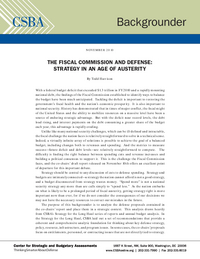
With a federal budget deficit that exceeded $1.3 trillion in FY 2010 and a rapidly mounting national debt, the findings of the Fiscal Commission established to identify ways to balance the budget have been much anticipated. Tackling the deficit is important to restoring the government’s fiscal health and the nation’s economic prosperity. It is also important to national security. History has demonstrated that in times of major conflict, the fiscal might of the United States and the ability to mobilize resources on a massive level have been a source of enduring strategic advantage. But with the deficit near record levels, the debt load rising, and interest payments on the debt consuming a greater share of the budget each year, this advantage is rapidly eroding.
Unlike like many national security challenges, which can be ill-defined and intractable, the fiscal challenge the nation faces is relatively straightforward to solve in a technical sense. Indeed, a virtually infinite array of solutions is possible to achieve the goal of a balanced budget, including changes both to revenues and spending. And the metrics to measure success—future deficit and debt levels—are relatively straightforward to compute. The difficulty is finding the right balance between spending cuts and revenue increases and building a political consensus to support it. This is the challenge the Fiscal Commission faces, and the co-chairs’ draft report released on November 10th offers an excellent point of departure for this important debate.
Strategy should be central to any discussion of cuts to defense spending. Strategy and budgets are intimately connected—a strategy the nation cannot afford is not a good strategy, and a budget disconnected from strategy wastes money. “Spend more” is not a national security strategy any more than are calls simply to “spend less.” As the nation embarks on what is likely to be a prolonged period of fiscal austerity, getting strategy right is more important now than ever, for if we do not consider the consequences of our decisions we may not have the necessary resources to correct our mistakes in the future.
The purpose of this backgrounder is to analyze the defense proposals contained in the co-chairs’ report and place them in a strategic context. This analysis draws heavily from CSBA’s Strategy for the Long Haul series of reports and annual budget analysis. In the Strategy for the Long Haul, CSBA laid out a set of recommendations that provide a coherent and comprehensive analytic foundation for thinking about key defense strategy, policy, resource, infrastructure, and program issues. In some cases, the co-chairs’ proposals focus on entitlements, personnel, or contracting issues that are not directly tied to strategy.
These proposals are analyzed for the soundness of their recommendations, the budgetary effects they would produce, and consistency with the overall package of proposals.
Download the PDF to view a summary of the major defense proposals in the co-chairs’ report and CSBA’s analysis.



























